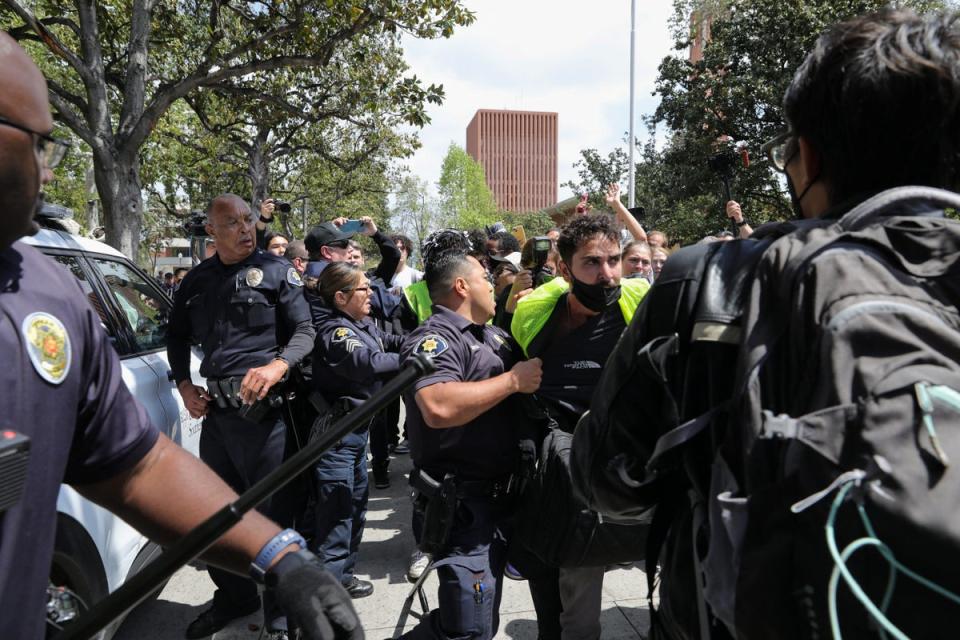USC cancels main commencement ceremony following chaotic pro-Palestine protests
The University of Southern California has announced it will not hold its main 2024 graduation ceremony amid pro-Palestone protests on campus and criticism over a previously canceled student speaker.
The institution announced the decision on Thursday after protestors clashed with campus security and police on Wednesday. More than 90 protesters were arrested during the demonstrations.
USC’s 2024 commencement ceremony was scheduled for 10 May. The university said it will still host dozens of commencement events, including all the traditional individual school commencement ceremonies where students cross a stage and receive their diplomas.
A planned commencement speech by the school’s pro-Palestinian valedictorian, Asna Tabassum, was cancelled earlier this month, with USC citing unspecified “safety concerns”.
Thursday’s statement from USC read: “With the new safety measures in place this year, the time needed to process the large number of guests coming to campus will increase substantially.
4/25—An important update for 2024 Commencement: https://t.co/tWbSGOxy8v
— USC (@USC) April 25, 2024
“As a result, we will not be able to host the main stage ceremony that traditionally brings 65,000 students, families, and friends to our campus all at the same time and during a short window from 8:30am to 10 am.”
It continued: “We understand that this is disappointing; however, we are adding many new activities and celebrations to make this commencement academically meaningful, memorable, and uniquely USC, including places to gather with family, friends, faculty, and staff, the celebratory releasing of the doves, and performances by the Trojan Marching Band.”
The Los Angeles Police Department (LAPD) said more than 90 people were arrested on Wednesday night during a protest on the campus for alleged trespassing. One person was arrested for alleged assault with a deadly weapon.
The USC demonstrations ultimately descended into violence, with armed police arriving to disperse students with rubber bullets and riot gear.

The demonstrations and unrest at USC echo similar events taking place on campuses across the US. Similar shocking scenes played out in states including Georgia, where police using tasers on restrained students and shooting pepperballs at demonstrators at Emory University.
The widespread unrest follows arrests by students at Columbia University in New York earlier this month. More than 100 people were arrested at Columbia alone in connection to the protest encampments which are asking the school to divest financial ties to the war in Gaza. Protests in at unversities in other states, including USC, have espoused similar sentiments.
Students previously told The Independent that following the protests returning to campus felt “wrong” and that their final weeks of academia had been “tainted” by USC’s response the protests.
“It’s not an atmosphere of celebration. It’s an atmosphere of grief in a way. I think people were just really reconsidering what it means to graduate from USC,” Alan, a senior at USC – due to graduate on 10 May – told The Independent.
“I’m a graduating senior. This is my graduating class. And it feels wrong to even come back to campus or to even celebrate this final week like this.
“I will never have this week again… and it’s hurtful that this is how we’re going to leave. Like, I will always remember my last week of school knowing that USC violated us. USC did not stand for us.”
Prior to the cancellation of its main ceremony, the lead up to the USC commencement event in May had already been marred by controversy, after it was announced that the 2024 valedictorian, Asna Tabassum, would not be giving a speech at the event due to unspecified “safety concerns”.
Ms Tabassum describes herself as a first-generation South Asian-American Muslim and includes a link to a pro-Palestinian website in her social media bio. She said she felt “profoundly disappointed” by USC’s decision and “abandoned” by “my home of four years”. Advocacy groups CAIR Greater Los Angeles said the decision “empowers voices of hate” and violated the university’s obligation to protect its students.
